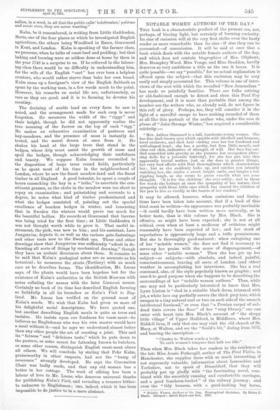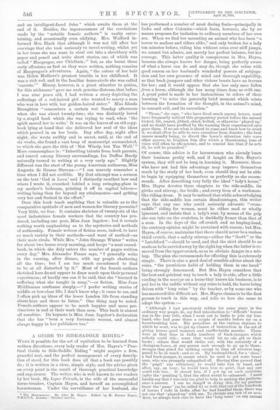NOTABLE WOMEN AUTHORS OF THE DAY.* Tins book is a
characteristic product of the present era, not, perhaps, of blazing light, but certainly of burning curiosity. Its sins of omission will at the very first strike even the hasty reader as more remarkable than its sins—if sins they can be accounted—of commission. It will be said at once that a book which deals with the notable female authors of the day, and which does not contain biographies of Mrs. Oliphant, Mrs. Humphry Ward, Miss Yonge, and Miss Braddon, hardly deserves so very ambitious a title as the one it bears, It is quite possible—we say possible," for no actual explanation is offered upon the subject—that this exclusion may be very easily and simply accounted for. This volume is one of inter- views of the sort with which the so-called "New Journalism" has made us painfully familiar. There are folks retiring or old-fashioned enough to detest and shun this Paul Pry development, and it is more than probable that among the number are the writers who as already said, do not figure in this roll of glory. Perhaps, too, they will consider it in the light of a merciful escape to have nothing recorded of them at all like this portrait of the author who, under the neat de plume of "John Strange Winter," has acquired a considerable celebrity :— " Mrs. Arthur Stannard is a tall, handsome young woman. She has fine dark-brown eyes which sparkle with intellect and humour, level eyebrows, and dark hair curling over her low forehead and well-shaped head ; she has a pretty, but firm little mouth, and clear cut chin, indicative of strength of will. Her face has set- tled somewhat into gravity as shepursues her occupation (dres- sing dolls for a juvenile festivity), for she has put into this apparently trivial matter, just as she does in greater things, her very best efforts with that thoroughness which characterises her ; but as she suddenly looks up, and catches you intently watching her, she smiles a sweet, bright smile, and laughs a low rippling laugh, as she seems to guess exactly what are your thoughts. 'It is for the children,' she says softly; and in these few words she betrays at once the sympathy of her nature, that sympathy with these little ones which has caused the children of her pen to live so vividly in the hearts of her readers."
It may be allowed, however, when omissions and limita- tions have been taken into account, that if a book of this kind must be written—its appearance was probably inevitable —it could hardly have been written more naturally, or in better taste, than is this volume by Mrs. Black. She is effusive, as might have been expected; she is not at all critical, even when at least a modicum of criticism might reasonably have been expected of her ; and her stock of superlatives is oppressively large and a trifle promiscuous. But she is thoroughly good-natured ; when eulogising one of her "notable women," she does not find it necessary to serve-up her praise with the sauce of disparagement,—of some other " notable woman." Then she has got up her subject—or subjects—with absolute, and indeed painful, conscientiousness, braving all sorts of London (and other) weather in accomplishing her interviews. She has a real command, also, of the style popularly known as graphic; and uses it to good purpose when she happens to be describing the surroundings of her "notable women authors." Thus, while one may not be particularly interested to know that Mrs. Lynn Linton is " clad in a suitable black dress, trimmed with jet, a white lace cap partially covers the thick grey hair, which escapes in a tiny natural curl or two on each side of the smooth intellectual forehead," or even that " a Persian carpet of sub- dued tints covers the floor" of her " cosy library," one can enter with heart into Mrs. Black's account of " the sleepy little village" of Upper Halliford, in Middlesex, where Mrs.
Riddell lives, if only that one may visit the old church of St. Mary, at Walton, and see the "Scold's bit," dating from 1632,
and bearing the inscription ;— " Chester to Walton sends a bridle
To curb women's tongues that talk too idle."
Then when Mrs. Black takes her readers to the residence of the late Miss Jessie Fothergill, author of The First Violin, in Manchester, she supplies them with so much interesting, if not supremely valuable, information about Lancashire and -Yorkshire, not to speak of Dusseldorf, that they will probably put up gladly with " the fascinating novel, com- bined with the smoothly running and comfortable carriages, and a good luncheon-basket" of the railway journey; and even the " tidy hansom, with a good-looking bay horse, • Notable Womon Authors of the Dag. Biographical Sketches. By Helen C. Black. Glasgow David Bryce and Sou. 1883. and an intelligent-faced Jehu " which awaits them at the end of it. Besides, the ingenuousness of the revelations made by the " notable female authors " is vastly enter- taining, and occasionally even edifying. Mrs. Walford in- formed Mrs. Black that although it was not till after her marriage that she took seriously to novel-writing, whilst yet in her teens she was wont to steal out into a shrubbery with paper and pencil and write short stories, one of which was called " Macgregor, our Chieftain ; " but, as she burnt these early effusions as fast as they were written, nothing remains of Macgregor's adventures. Again, " the colour of her hair was Helen Mathers's greatest trouble in her childhood. It was a rich red, and in the familiar home-circle she was called carrots.' " Misery, however, is a great stimulus to genius, for this nickname " gave me such genuine distress, that before I was nine years old, I had written a story depicting the sufferings of a red-haired girl who wanted to marry a man who was in love with her golden-haired sister." Miss Rhoda Broughton "remembers a certain wet Sunday afternoon when she was about twenty-two ; she was distinctly bored by a stupid book which she was trying to read, when the spirit moved her to write.' It was on the leaves of an old copy- book lying at hand that she delivered her soul of the ideas -which poured in on her brain, Day after day, night after night, she wrote swiftly and in secret, until, at the end of six weeks, she found a vast heap of manuscript accumulated, to which she gave the title of Not Wisely, but Too Well.' " More commonplace is : " Inheriting talents from both parents, and reared among literary surroundings, Iza Deus Hardy naturally turned to writing at a very early age." Slightly different was the start of the young American authoress, Miss Augusta de Grasse Stevens :—" I can scarcely remember a time when I did not scribble. My first attempt was a sermon on the text God is Love,' and I distinctly recollect how and where I wrote it, crouched behind a long swinging-glass in my mother's bedroom, printing it off in capital letters— writing being then far beyond my attainments—and getting very hot and flushed in the effort."
Does this book teach anything that is valuable as to the comparative aptitude of men and women for literary pursuits P Very little, we fear. It contains sketches of twenty-six of the most industrious female workers that the country has pro- (laced, including one poet, Miss Jean Ingelow; but it reveals nothing worth emphasising as to the mysteries and methods of authorship. Female writers of fiction seem, indeed, to have as much variety in their methods—and want of method—as their male rivals. While Mrs. " John Strange Winter" writes for about two hours every morning, and keeps " a neat record- book, in which she duly enters the number of pages written every day," Mrs. Alexander Fraser says, " I generally write in the evening, after dinner, with my people chattering all the time; but I am too much accustomed to that to be at all disturbed by it." Most of the female authors sketched here do not appear to draw much upon their personal experiences; of hardly one can it be said, that she "learned in suffering what she taught in song,"—or fiction. Miss Jean Middlemass confesses simply,—" I prefer writing stories of middle or low-class life, I don't know why ; it came to me, and I often pick up ideas of the lower London life from standing about here and there to listen." One thing may be noted. Female authors appear to be much happier and more per- tinacious in and at their work than men. This book is almost all sunshine. Its keynote is Miss Jean Ingelow's declaration that she has " been a very fortunate woman, and almost always happy in her publishers too."



















































 Previous page
Previous page